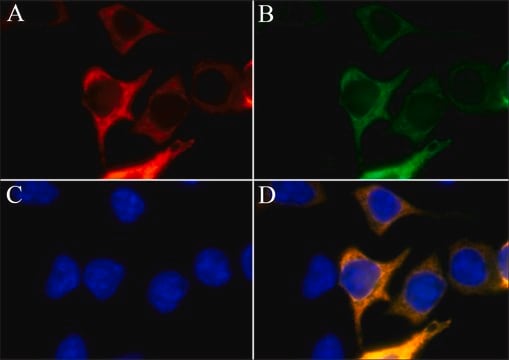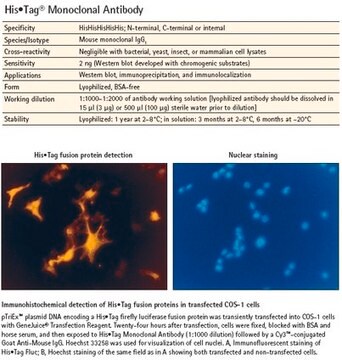SAB4200735
Anti-CRISPR/CAS9 -FITC antibody, Mouse monoclonal
clone 7A9-3A3, purified from hybridoma cell culture
Synonyme(s) :
Anti-CRISPR-associated protein-9 nuclease, Anti-Crispr, Anti-Crispr RNA
About This Item
Produits recommandés
Conjugué
FITC conjugate
Niveau de qualité
Forme d'anticorps
purified from hybridoma cell culture
Type de produit anticorps
primary antibodies
Clone
7A9-3A3, monoclonal
Forme
buffered aqueous solution
Conditions de stockage
protect from light
Concentration
~1.0 mg/mL
Technique(s)
immunofluorescence: 1:200-1:400 using human HEK-293T cells over-expressing CAS9 protein
Isotype
IgG1
Numéro d'accès UniProt
Conditions d'expédition
dry ice
Température de stockage
−20°C
Modification post-traductionnelle de la cible
unmodified
Description générale
The type II CRISPR/Cas system has been adapted to expression in eukaryotic cells. The Cas9 endonuclease can be engineered with a single gRNA (guide RNA), directing a DNA double-strand break (DSB) at a desired genomic location. As a result, the cell activates endogenous DNA repair processes, either non-homologous end joining (NHEJ) or homology-directed repair (HDR). In comparison to other genome-editing technologies such as designer zinc fingers (ZFs), transcription activator–like effectors (TALEs) and homing meganucleases, the CRISPR/CAS9 system is a scalable, affordable and easy to engineer. Therefore, the anti-CRISPR/CAS9-FITC conjugated antibody can be a useful tool for detecting CRISPR/CAS9 positively transfected cells, revealing DSB sites in their genome.
Immunogène
Application
Forme physique
Stockage et stabilité
Autres remarques
In order to obtain best results in different techniques and preparations we recommend determining optimal working concentration by titration test.
Vous ne trouvez pas le bon produit ?
Essayez notre Outil de sélection de produits.
Code de la classe de stockage
10 - Combustible liquids
Point d'éclair (°F)
Not applicable
Point d'éclair (°C)
Not applicable
Certificats d'analyse (COA)
Recherchez un Certificats d'analyse (COA) en saisissant le numéro de lot du produit. Les numéros de lot figurent sur l'étiquette du produit après les mots "Lot" ou "Batch".
Déjà en possession de ce produit ?
Retrouvez la documentation relative aux produits que vous avez récemment achetés dans la Bibliothèque de documents.
Notre équipe de scientifiques dispose d'une expérience dans tous les secteurs de la recherche, notamment en sciences de la vie, science des matériaux, synthèse chimique, chromatographie, analyse et dans de nombreux autres domaines..
Contacter notre Service technique








